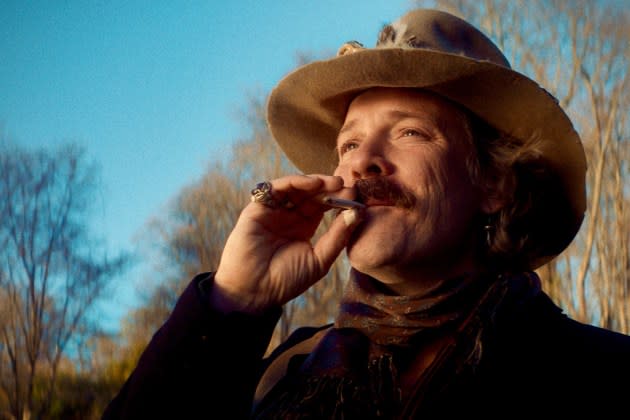‘Coup!’ Review: Peter Sarsgaard Is a Winning Impostor in a Droll and Breezy Take on Class Conflict
- Oops!Something went wrong.Please try again later.
- Oops!Something went wrong.Please try again later.

Although Coup! has a small cast and unfolds mostly in a secluded mansion during the 1918 influenza pandemic, it packs a lot of flavor, suspense and droll comedy into its slim 97-minute running time, making it fun enough to deserve an exclamation point in its title. Peter Sarsgaard offers a sly, juicy performance as a shady chef who weasels his way into the home of an entitled young heir (Billy Magnussen). Soon, the upstart is turning the servants and family members against the hypocritical patriarch, who fancies himself a progressive. A collaborative effort between writer-directors Austin Stark (The God Committee, The Runner) and Joseph Schuman, this satirical work is hardly profound or subtle about the parallels with the present-day class conflict, but it wears its screw-the-rich subtext with insouciant breeziness.
In the opening minutes, Sarsgaard’s Floyd Monk is met shaving off his beard and styling his mustache, seemingly to make himself look more like the man lying dead in the next room with a bullet in his head, whose passport Floyd takes. Only much later will we learn about his relationship to the dead man. But given that background checks weren’t so easy to execute in the 1910s, especially during a pandemic, Floyd has no problem passing himself off as the chef an employment agency has found for the Horton family, residents of a mock Palladian mansion on Egg island, a boat ride away from New York City. The head of the family, Jay (Magnussen, who, like Sarsgaard, is also an executive producer here), has inherited the estate from his father, a meat-packing magnate whom Jay nevertheless exposed as a bad employer in the pages of The Progressive Tribune, the newspaper for which he writes.
More from The Hollywood Reporter
Although he has vowed to give the estate to the poor someday, Jay isn’t so pure as to refuse to live there now with his wife, Julie (Sarah Gadon), a writer in her own right, and their two young children, Tom (Callum Vinson) and Molly (Willa Dunn). Also living on the estate are the servants — no, scratch that, the staff, as Horton insists they’re called: Irish housekeeper Mrs. McMurray (Kristine Nielsen), Black maid Mrs. Tidwell (Skye P. Marshall), whose husband (unlike Jay) is fighting overseas, and chauffeur-butler Kaan (Faran Tahir), a Turkish-immigrant. All of them live in a small cottage down the hill while the family enjoys the mansion, with its 12 bedrooms and gorgeous indoor swimming pool that only the family may use. (The actual pool is located not in the New Jersey house seen but in another historical building, Pleasantdale Chateau, a wedding venue in West Orange, New Jersey, and yes, offers of accommodation would be gratefully received.)
Floyd quickly settles in and wins round Julie, the kids, Mrs. Tidwell and Kaan with his cooking, card tricks and breezy Southern charm. Jay, who spends his days writing muckraking anti-Woodrow Wilson journalism that feigns reportage from the pandemic-infected streets of New York but is actually written in a plush library at his home, is less easily charmed. The indomitable Mrs. McMurray also quickly spots that there’s something fishy about Floyd, and not in a culinary sense. A few foraged mushrooms in her soup, however, send Mrs. McMurray off to the hospital, and Floyd proceeds with his quiet coup, rallying the other servants to ask for better wages and lodgings as a first step. When the pandemic cuts off access to Egg Island, the need to forage for food becomes more urgent and Jay, a staunch vegetarian, is compelled to let the children eat meat. His authority is gradually chipped away bit by bit by the wily chef, who knows just how to play the situation to his advantage.
Obviously, the weird mixture of isolation, paranoia and rusticated liberation will be familiar to anyone who spent the COVID-19 pandemic in a bubble, especially if that bubble was out in the countryside. Stark and Schuman are quite frank in the film’s press notes about being inspired by stories of Manhattanites fleeing to the Hamptons and upstate New York, where the usual hierarchies felt challenged by the crisis. Setting the story in 1918 instead of the more recent past offers an opportunity to examine both how little and how much America has changed in a century, while also affording a chance to revel in the music, Edwardian fashions and Belle Epoque luxury of the period. It’s also an opportunity to rope in Fisher Stevens for a cameo as the progressive writer Upton Sinclair, and that’s quite a treat.
Best of The Hollywood Reporter
Kim Cattrall and Five Actors Who Made Surprising Returns to a Role
10 Times Hollywood Predicted the Scary (or Not So Scary) Future of AI
21 Actors Who Committed to Method Acting at Some Point in Their Career

